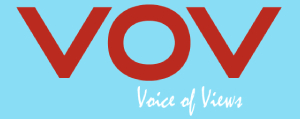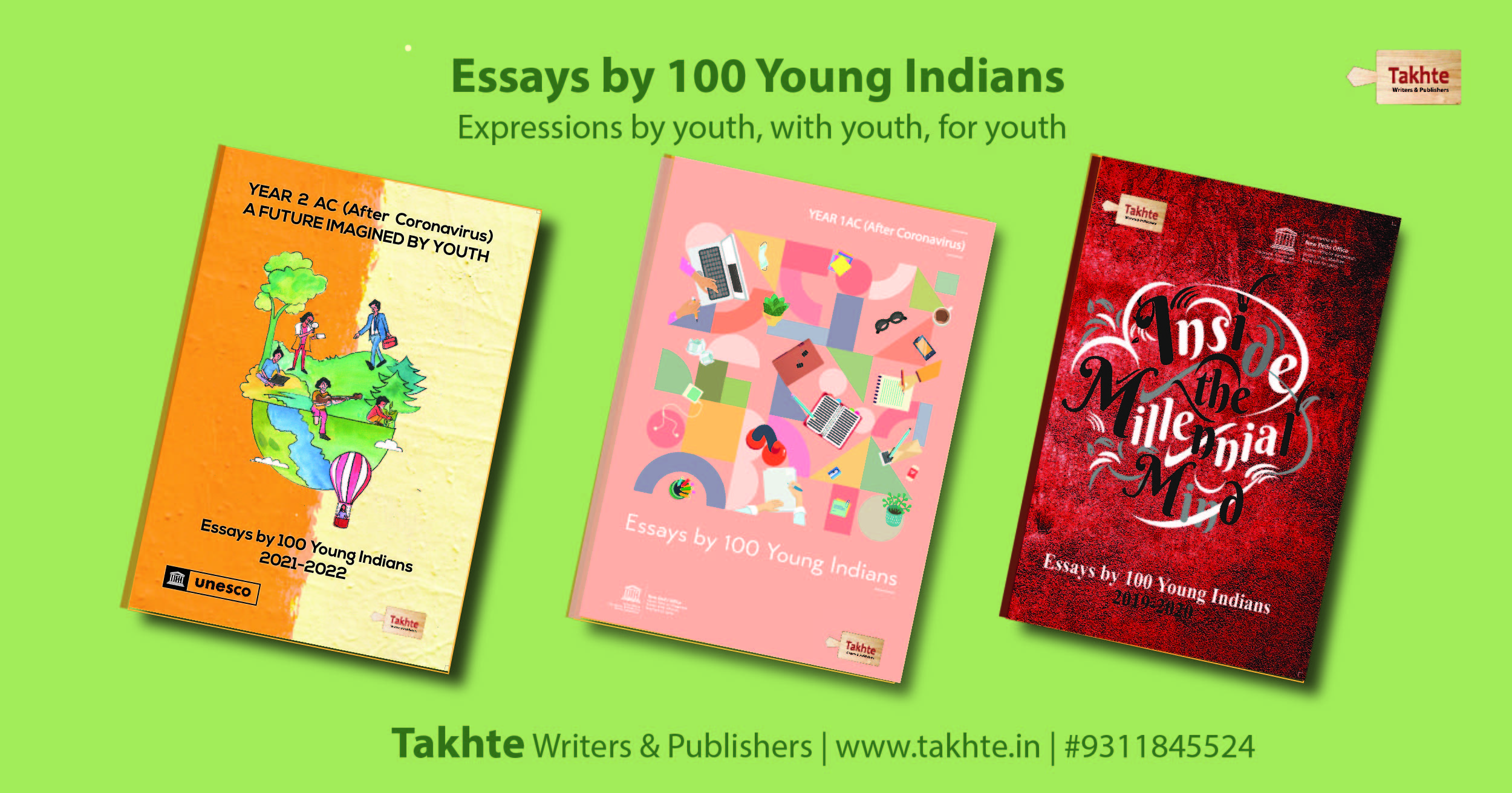Contest Essays
YEAR 2 AC (After Coronavirus): A Future Imagined by Youth

Varalika Singh
Delhi Public School Ghaziabad
Meerut Road Industrial Area
Uttar Pradesh
Weekly Winner
(Pan India Online Essay Contest 2021- 3rd Edition)
Category – Youth
Essay Topic:
The coronavirus has highlighted social and gender inequalities, such as the rise in domestic abuse, loss of education access, and the reduction of job opportunities for urban migrant workers. What kinds of responses are needed to address prevailing inequalities and violence? What kind of role can youth play in this space?
Dear Reader, as your eyes scurry past these words, the dust-ridden keys of my laptop have grown to quieten themselves with the winding of these two years. We are but two surviving thespians of a bleak chapter in human history. Several tropes have surfaced in the lush refuge of our homes- be it when yellow journalism donned images of greyscale workers, the burdens of whom were reduced to the striped luggage on their backs; eyes resting atop carefully tucked blue masks, stripping phones of their wealth; or even as simple as the abstractions of normality whisked from the restful junction of human thought.
Young children, particularly girls, are robbed of the scurries of pens and chalked letters of a ‘cultured’ barring. The COVID-19 pandemic has regressed, if not virtually plundered, the prospect of formal education for thousands across the country. E-learning has been not only a monetary forfeiture but also an unbidden burden of conversance with black screens and cyber territories. The harrow of a privileged upper-class discomfort with the ‘new normal’ drowns the voice of communities that have known a world no better than one where they are censored and fettered in the event of crime and woe. You see, Dear Reader, fate has favoured us in a realm built not on columns of hope but crumbling scaffoldings and crushed vows of deliverance. Though this may be a belief stitched by circumstance, hereafter carved by the young still has potential.
Weaving policies that enfold the Sustainable Development Goals, fabricating tangible societal blueprints and importantly, placing the sustenance of humankind on the highest pedestal must find themselves in resolutions of Gen-Z- perhaps alongside nationalizing avocado toasts and IT sectors to archive memes. The primary challenge before us is to counter the disproportionate access to education and employment opportunities. Prioritising education that is vocational, career-centric, and sex-education may weaken contemporary confines of qualitative access.
We must end the shallow identity-rhetoric in the public realm that consistently employs visually miserable depiction and thus, engrains a standardised, generational notion of reality. Collectively, we must advocate for the politicisation of affirmative action for the LGBTQI+ community, historically oppressed castes and the urban-rural poor. Paralleling this, especially with the inordinate attacks on communities that do not identify as cisgender, heterosexual or male, we should emphasise intersectional redressal of gender and caste-based atrocities focusing on non-binary, intersex and transgender individuals.
In the long run, institutional reform, in addition to informal social protection mechanisms, must be formulated to address and alleviate domestic violence and skewed distribution of reproductive healthcare, psychosocial aid and law-enforcement measures. Furthermore, we should endorse and invest in organisations led by marginalised groups to strengthen socio-economic protection and empowerment. Thus, we can chisel an environment where decision-making and executive action is led by individuals which it has sought to aid. Furthermore, we must endeavour to end the vicious cycle of work in the informal sector which has unceasingly ripped vulnerable communities of mobility in work, life and continuance. The latter has worked itself into a transgenerational norm and thus calls for action coupled with the sustainability of action, orientation to sensitivity and consequently, driving social reform.
Dear Reader, I must say that today is an unfamiliar home but, tomorrow is an unrealised promise. But, when grief becomes tangible, when fate pins its verses in the lowly scads of history, and when the future beckons a youthful prescription to relieve itself of its past, the coming generations entrust themselves with responsibility, commitment and fidelity to a kinder, trusting world. Undeniably so, Dear Reader, you and I are bound by a lettered tribute- to the misguided love of a girl nestled among the locks and ceramics of Aligarh, trapped in that betray her thought, or a child in the crooks of an incense factory in Pune whose fading dreams douse themselves in the aroma, clasping the hope of a sweet return to home. We owe it to them to create inclusivity-driven societies which whittle at injustice for minds unbridled by the trouble of being born themselves.
Contest Essays
UNESCO and Takhte launch third book of youth essays ‘Year 2 AC (After Coronavirus)’
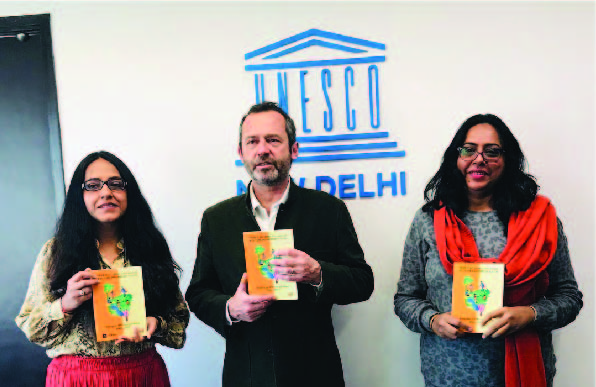
Continuing with the momentum of the previous editions of their pan India essay contest, the UNESCO New Delhi Cluster and Takhte launched the third edition of the Essay contest book, ‘Year 2 AC (After Coronavirus): A Future Imagined by Youth’ on 17 December 2021.
The book contains a compilation of 100 winning essays written by young Indians and presents their unique perspectives on the challenges that youth face in the wake of the COVID pandemic – from disruption to education, to massive increases in the use of digital challenges. The contest presented them with a platform to imagine solutions to these challenges, both for the short and long terms. Over 900 submissions from across 30 States and Union Territories were received.
The book is a must-read to understand the observations, perspectives, and foresight of young writers across India. It includes a plethora of issues covered by the young writers, varying from education to culture, community to biodiversity, and the environment to disruptions in tourism. The anthology of essays is distinctive and unique, providing an important space for young people to demonstrate their knowledge, capacities, and drive for action.
“This book serves as a repository of reflections drawn directly from the minds of young people across India. What is so inspiring about these essays, however, is that a common thread can be found in young people’s desire and energy for change. They are demonstrating that they have the knowledge and wherewithal to step up and be part of the solution as we recover from the challenges of the pandemic,” said Eric Falt, UNESCO New Delhi Director.
“Writing can be therapeutic. Children and youth must pen their thoughts as it can be incredibly relieving during these challenging times. Channelling the energy to the exclusive way of expressing and journaling can help one find better solutions,” said Goldie Kasturia, Founder -Takhte & VOV.
Reposted from UNESCO, New Delhi website
The book can be purchased from Takhte’s cart https://takhte.in/cart.php
Contest Essays
YEAR 2 AC (After Coronavirus): A Future Imagined by Youth
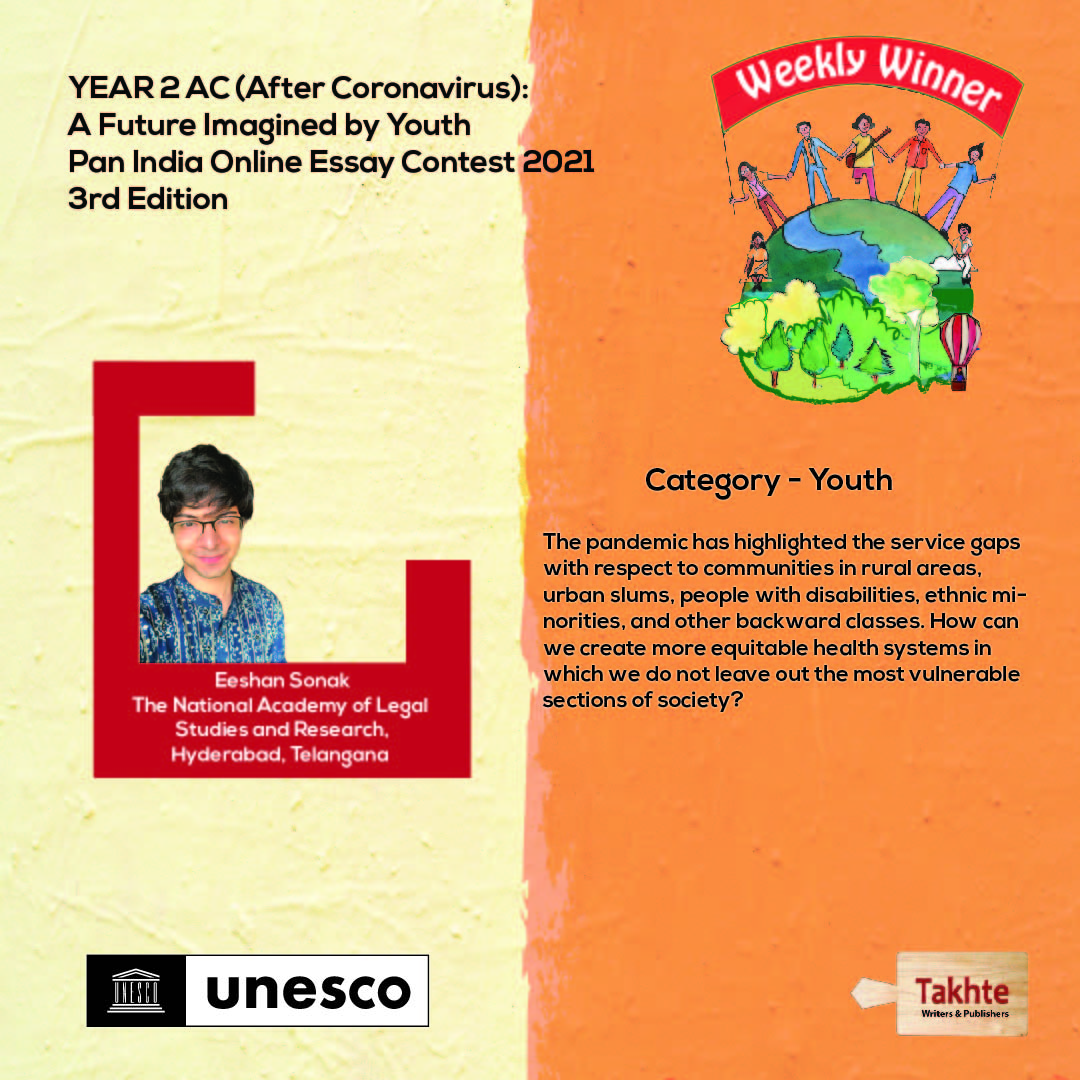
Eeshan Sonak
The National Academy of Legal Studies and Research
Hyderabad
Telangana
Weekly Winner
(Pan India Online Essay Contest 2021- 3rd Edition)
Category – Youth
Essay Topic:
The pandemic has highlighted the service gaps with respect to communities in rural areas, urban slums, people with disabilities, ethnic minorities, and other backward classes. How can we create more equitable health systems in which we do not leave out the most vulnerable sections of society?
Justice Albie Sacha, the legendary South African Jurist, while hearing the Soobramoney case, was faced with a moral dilemma. Mr Soobramoney, a patient suffering from chronic renal failure, approached the South African Supreme Court asking to order the state hospital’s dialysis service to keep death away for as long as its machines could keep him alive. The hospital’s limited resources meant that only a few renal failure patients could be administered life-saving dialysis treatment. Mr Soobramoney did not qualify for treatment at the State’s expense, as he was unlikely to recover even after treatment and only hoped to gain a few years of life.
Reading about this case and the difficult choice the Court had to make in refusing to interfere was my first introduction to the moral complexity of the enforcement of socio-economic rights. I learnt that resources are always limited. By their very nature, socio-economic rights involve rationing. Such rationing cannot be considered a restriction of the right to access services like healthcare, but the very precondition for its proper exercise. Unlike the right to free speech, which by its very nature is not rationed, the right to access health care is shared, often competitively, with other holders of the right. Therefore, socio-economic rights must have different legal characteristics from the exercise of a classical individual civil right that is autonomous and complete in itself.
While the framing of our Constitution guaranteed first-generation civil and political rights, it has been far from successful in ensuring a progressive realization of second-generation socio-economic rights such as food, housing, health, education and welfare. The inequitable distribution of services has always been regarded as an inherited consequence of past injustice and no indications of a failure to meet current societal obligations.
In this essay, as a law student, I shall use the law and public policy lens to approach the inequitable distribution of healthcare services. As I see it, there are two co-related issues involved: first, the scarcity of healthcare services and resources, and second, the cornering of the few available resources by the dominant classes. In rural India, the first issue poses a, more significant problem. In contrast, in the urban metropolis, we see that the issue is not the inadequacy of facilities but their skewed distribution.
In addressing the first issue, I would draw a parallel to the environment I am most comfortable with- the law school setting. Like most law students in the top tier, National Law Universities seek corporate placements, many of the most gifted medical students seek jobs at high paying private hospitals in urban areas or even abroad. Apart from the existing policies; there should be measures that incentivize a civic sense of community service and social impact. I believe that this model would better tackle the crisis of inadequacy of medical services in rural India. However, understandably, the issue of capacity building in the healthcare sector is a mammoth task that must be progressively achieved.
What is less spoken of and equally destructive is the second issue- the cornering of existing services by a few. In the realm of health, no individual can be faulted for using their resources to gain the best possible treatment or care. I think the burden of addressing this concern rests on those formulating healthcare policy. Private hospitals often enjoy far greater infrastructural facilities and other resources vis-à-vis government hospitals. Apart from strengthening Government hospitals to bridge this wide gap, we could have a policy mandatorily requiring private hospitals to play a more significant part in the cost-free treatment of vulnerable sections of society. In sum, I see instilling a civic sense in the populace and introducing policies as the way forward in addressing the issue of our inequitable health systems.
Contest Essays
YEAR 2 AC (After Coronavirus): A Future Imagined by Youth
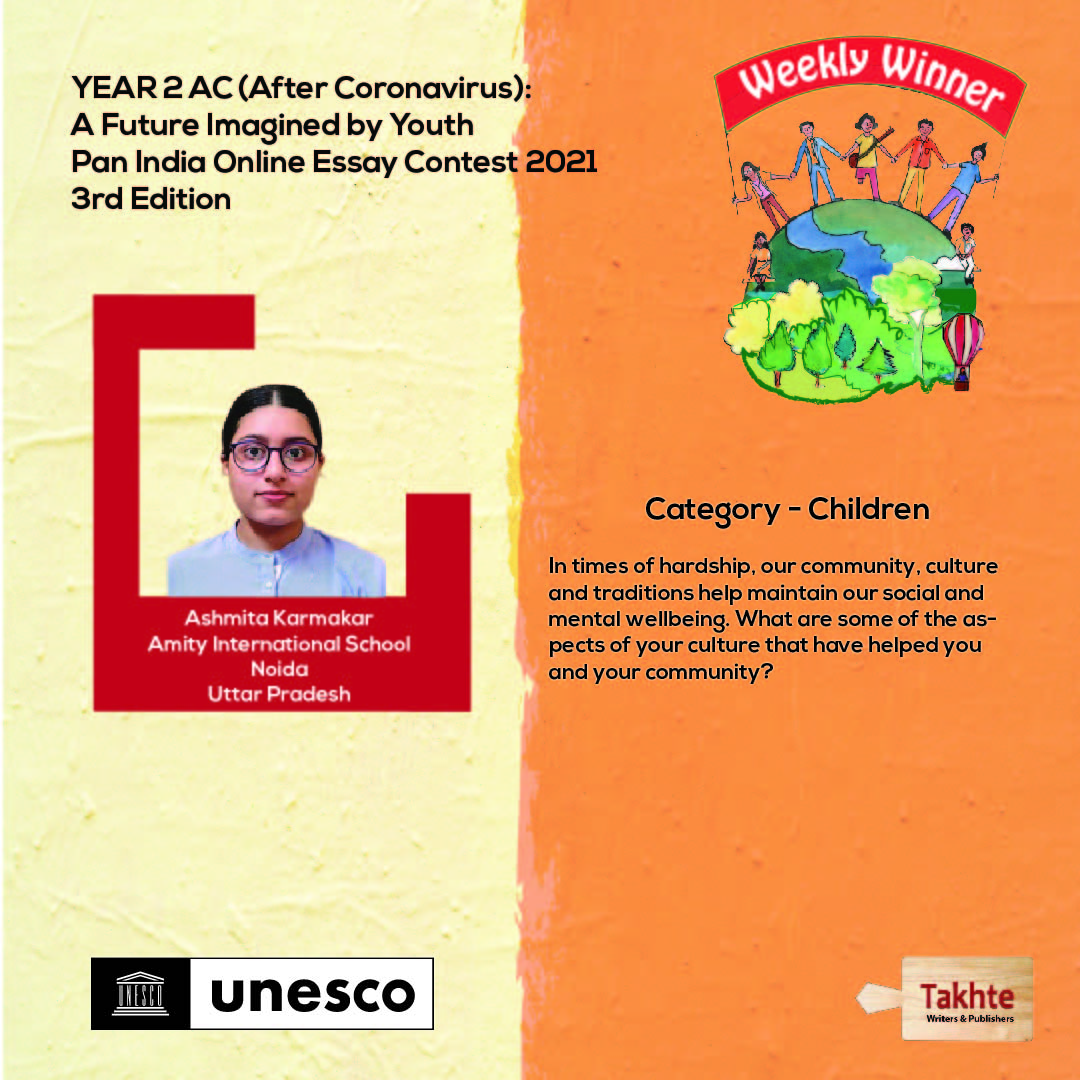
Ashmita Karmakar
Amity International School
Noida
Uttar Pradesh
Weekly Winner
(Pan India Online Essay Contest 2021- 3rd Edition)
Category – Children
Essay Topic:
In times of hardship, our community, culture and traditions help maintain our social and mental wellbeing. What are some of the aspects of your culture that have helped you and your community?
WAS IT HALF-EMPTY OR HALF-FULL?
As Trisha pressed the ‘Leave’ button, she sighed in distress. She averted most of the homework assigned by her English teacher. Today, she dropped yet another topic for an essay beyond her understanding. She exclaimed to herself, “How does she expect us to write a 200-word essay on the ‘Positive Side of the pandemic’?”. Trisha rushed to her grandmother, her problem-solver and support system.
As she knocked on the door impatiently, Trisha’s grandmother already knew that this knock of impatience must have taken birth from a homework dilemma that her granddaughter often encounters. She called Trisha in. And, with her grumpy slight frown, Trisha cribbed, “Dadi, I think English ma’am is an alien. How can she give such absurd topics to write essays on?” Granny laughed, and as she was about to comment, her talkative granddaughter continued. “You won’t believe what she gave us for homework today”, she continued. “She told us to write an essay on the ‘Positive Side of the Pandemic’, that too in 200 words”.
“I am positive that she was joking. How is there any positivity in the pandemic, nothing good has happened during this crisis! Millions died around the world; economies fell, thousand were left jobless, and..” she went on complaining about the Pandemic. Grandmother didn’t interrupt Trisha until she paused to catch hold of her breath, and she started speaking. “Trisha, any situation in life must be looked upon from two sides or perspectives. Every situation, including this pandemic, has both a positive and a negative side. You kept on complaining, as you only looked at its negative side. It is true that during today’s time, the negative impact of the pandemic is more prevalent, but this doesn’t mean that one can overlook its positive impact. Although, the positive may be in the minority, still, it is there. Your teacher has assigned you this Home-Work to encourage young children like you, widen your perspective, and not only rely upon one side of the situation. I hope you can understand what I am trying to explain.”
“No, no, Dadi. I am not able to understand. If it is so, then can you please tell me WHAT are Positive Impacts are? How can I look from a different perspective when only one perspective is present in this situation?”
Grandmother started narrating a story to Trisha. As they reached the end of the story, she asked Trisha, “What do you think, dear, was the glass half-empty or half-full?”. Trisha replied, “Granny, I think the glass is half-full; the protagonist should understand this, shouldn’t he? He should always look at things with a positive outlook!”. Grandmother, alas, said, “Trisha, just like the glass, every situation can be either looked upon through a positive viewpoint or a negative one. Like, the same glass, could be half-empty for one person and half-full for another, we can see the pandemic, too, with a positive outlook. It not only has its share of positive impacts, but it can also lead to some ever-lasting beautiful changes in the world. Now, put on your thinking caps and start working on your homework, okay sweetie?”
“Yes, granny”, she excitedly remarked. “I will get nothing but A+ grade in this essay, I promise. Thanks a ton, Dadi, you are the best!!”. She ran to her room with an enlightened mind and an energised soul.
The next day, she read out her essay and finished by saying, “In the end, I would like to mention if the ‘Glass was half-full or half-empty”. I think it was always full as the bright side always overshadows the dark side, no matter how dark the side is! Thank you!” As she muted herself, a huge round of applause and an array of compliments awaited her.
After her presentation, she rushed to her grandmother and again knocked impatiently. But this time, her Granny knew that it was a happily different knock.
-

 Poems3 years ago
Poems3 years agoPoems
-
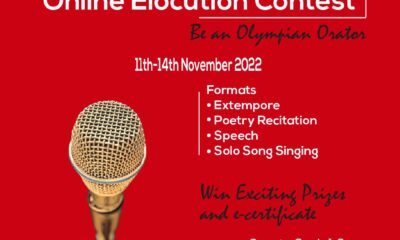
 Uncategorized2 years ago
Uncategorized2 years agoOnline Elocution Contest
-
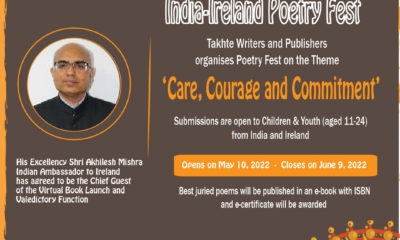
 Poems2 years ago
Poems2 years agoIndia-Ireland Poetry Fest
-

 Legal Talks3 years ago
Legal Talks3 years agoCompliances Relating to the Commercialization of Electronic Devices
-
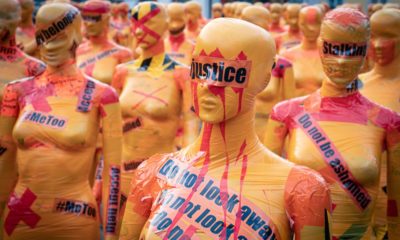
 Legal Talks3 years ago
Legal Talks3 years agoCUSTODIAL RAPE IN LIGHT OF THE MATHURA GANG RAPE CASE
-

 Art & Culture3 years ago
Art & Culture3 years agoThe Lore of the Days of Yore: Significance of History
-

 Short-story3 years ago
Short-story3 years agoBibek’s visit at his friend’s bungalow
-
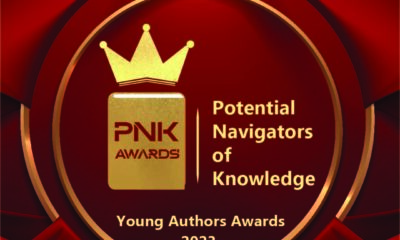
 Uncategorized1 year ago
Uncategorized1 year agoPotential Navigators of Knowledge (PNK) Young Authors Awards
